No products in the cart.
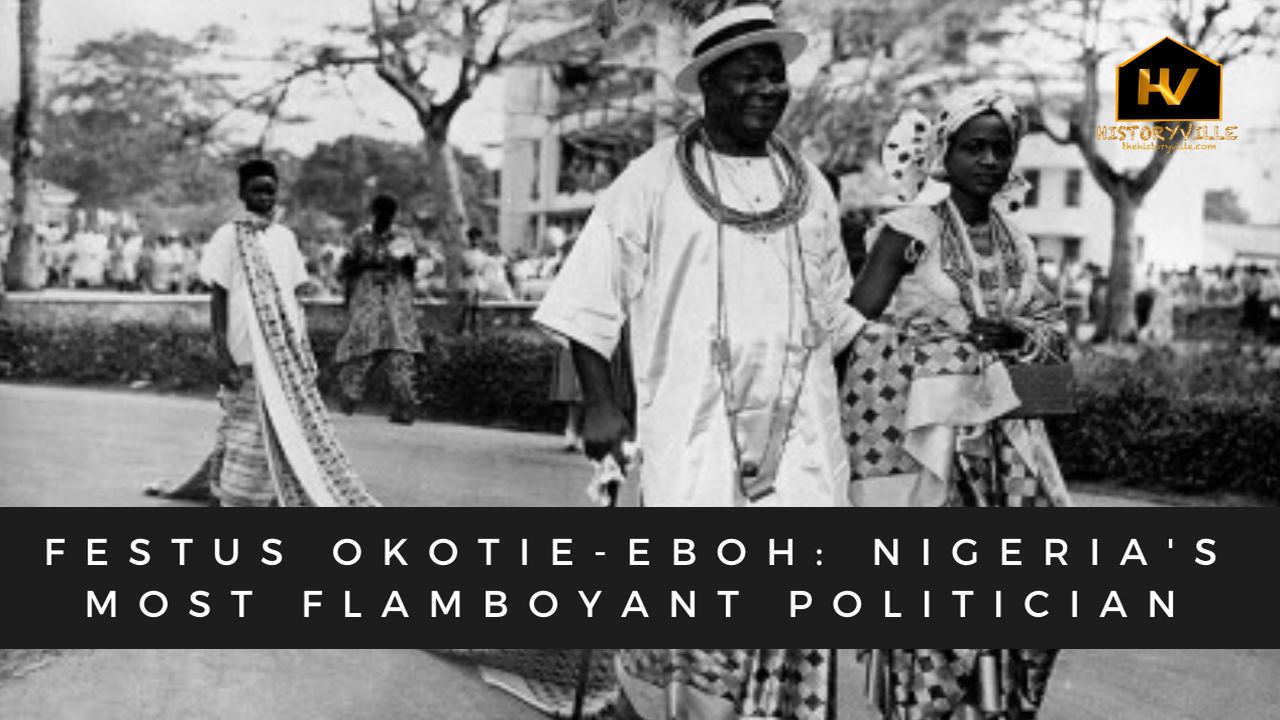
Festus Okotie-Eboh is unarguably the most flamboyant Nigerian politician of all time. As Federal Minister of Labour and Welfare and Finance Minister during the Sir Abubakar Tafawa Balewa administration, he was very rich, influential, and powerful. He even maintained a personal relationship with the 35th President of America, John F. Kennedy.
As Federal Minister of Finance, Okotie-Eboh founded the Central Bank of Nigeria in 1959 and was also instrumental in bringing Julius Berger to Nigeria in the quest to build the Eko Bridge. During the visit of Queen Elizabeth II to Nigeria in 1956, Okotie-Eboh was an epitome of stylish fashion and a cynosure of all eyes.
As Federal Minister of Finance, Festus Okotie-Eboh was instrumental in the founding of Nigeria’s Central Bank in 1959. He was an epitome of stylish fashion, as you can see in the picture, with his wife Victoria in 1956 when Queen Elizabeth II visited Nigeria.
Early Life and Education
Born Samuel Edah, Festus Okotie-Eboh was born on July 18, 1912, to Prince Okotie-Eboh at Benin River, in the Warri division (Edah adopted him, so he later changed his name to Okotie-Eboh).
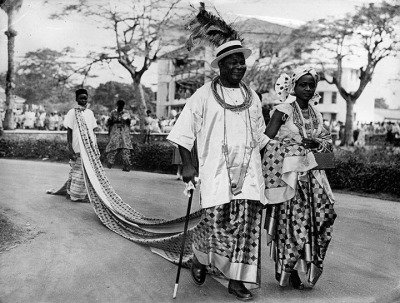
He attended Sapele Baptist School – a Missionary School and in 1930 he took up an appointment as an Assessment Clerk in Sapele Township Office. From 1931 to 1935, he taught briefly and later resigned to join the British Bata Shoe Company Limited, first as a Clerk, and rose to the post of Chief Clerk. From then on, his rise to fame and progress was phenomenal.
Career
While with the Bata Shoe Company, he attended several courses abroad which earned him a Diploma in Business Administration and Organisation. As a visionary, he decided to prepare himself for the future. He resolved to go into business on his own having learnt the first tentative steps in business under the Bata Shoe Company.
Okotie-Eboh soon became a rubber merchant cum timber magnate and he started off by opening a chain of schools and enterprises. Amongst them, Okotie Eboh Grammar School, Omimi Plastic and Shoe Factories, all of which laid the sound business foundation of his personal future before venturing into the public service and full-blown politics.
Political Life
Festus Okotie-Eboh actually entered political life, when he contested an election, in 1948 and became a member of the Warri Divisional Council, the Warri Provincial Council, Sapele Township Advisory Board, Warri Provisional Ports Authority Committee and the Warri Divisional Education Committee. He was never defeated at any local election either in Warri or in Sapele.
Chief Festus Okotie-Eboh, who had an Itsekiri father and an Urhobo mother, bestrode the political landscape of Warri and Sapele like a colossus and his political career climaxed as a top NCNC member when he was appointed a Chief Whip in the Western Regional House of Assembly dominated by Chief Obafemi Awolowo’s Action Group in 1954. His meteoric rise to the top did not stop there as he was appointed a Federal Minister of Labour and Social Welfare in 1955.
Death
In 1957, with the reconstitution of the federal cabinet, Chief F.S Okotie-Eboh became the first (and longest-serving) Minister of Finance for the Federation for a period of eight years, until his death in January 1966. Alongside the Prime Minister, Tafawa Balewa, Premier of the North, Sir Ahmadu Bello, Premier of the West, Chief Samuel Ladoke Akintola, and some other senior military officers, Okotie-Eboh was murdered during Nigeria’s first military coup that ended the country’s First Republic.
It is pertinent to note that Okotie-Eboh was the only Federal Cabinet Minister that was killed during that unfortunate coup.
At the time of his death, Chief Festus Okotie-Eboh was survived by 14 children and a wife; most of his children were very young. He was buried over one year later in Sapele without fanfare nor national honours.
Legacy
Although he was Federal Minister of Labour and Welfare in the closing years of British-Nigeria, Okotie-Eboh served longer and did more for Nigeria as Federal Minister of Finance. What he achieved in that office for Nigeria are on many fronts, the majority of which still exists today and will still be so into the foreseeable future.
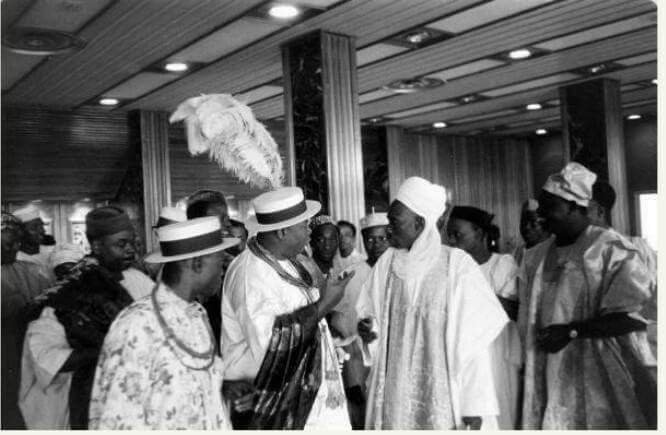
Some of his legacies are the establishment of the Central Bank of Nigeria; the inauguration of the first national currency; the establishment of the Nigerian Stock Exchange and the creation of the first Nigeria Investment and Development Bank in an era when such far-reaching decisions were dreamed of and concretised in the First Republic.
Since his assassination on January 15, 1966, Nigeria has had eleven issues (including re-issues) of her currency. Yet, Okotie-Eboh is not on any as the country’s pioneer Federal Minister of Finance who had done so much for it.
How Okotie-Eboh, Akintola, Balewa, and Bello were killed in Nigeria’s first military coup d’état, has been narrated in this book, A Carnage Before Dawn, a historical account of Nigeria’s first coup d’état. You can get the E-book here. Paperback here. And on Amazon Kindle and Amazon Paperback.
Sources
How Bello, Balewa, others were killed in January 1966
Ajeluorou A. and Salau G. (2016, January 17). Chief Festus Okotie-Eboh: Rich Echoes From The Past. Retrieved from https://guardian.ng/sunday-magazine/chief-festus-okotie-eboh-rich-echoes-from-the-past/
businessday.ng (2017, December 3). Chief Festus Okotie-Eboh: ‘Omimi Ejoh’, most flamboyant politician of all times. Retrieved from https://businessday.ng/news/news-features/article/chief-festus-okotie-eboh-omimi-ejoh-most-flamboyant-politician-of-all-times/
Odoshimokhe M. (2013, January 15). Okotie-Eboh: victim of circumstance. Retrieved from https://thenationonlineng.net/okotie-eboh-victim-of-circumstance/
3 Comments
View CommentsLeave a Reply
You must be logged in to post a comment.


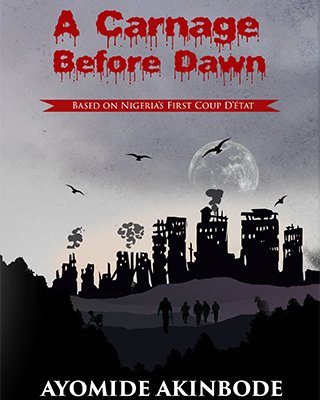
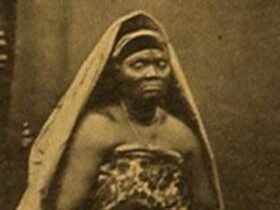




I must be honest, this is an interesting an educational history that every citizen of Nigeria need to see, it has affected the educational level positively, this history will never be forgotten from generations to come👏👏
It is great to have these priceless memoirs our history which never made it to the educational system. We need to teach generations to come about Nigerian history. I am interested in working on getting these stories to our educational system or some type of historic preservation site.
Yes, you are right. Good luck in your research.